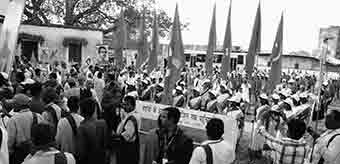
Stop Corporate Plunder,
Defend People’s Resources, People’s Rights
The CPI(ML)’s 9th Congress at Ranchi, Jharkhand, was a powerful assertion of the Left agenda and response to the challenges of today’s India. The theme of the Congress – calling for a defence of ‘ People’s Resources, People’s Rights’ against corporate plunder, smashing of the ‘Business-Politics Nexus’ and strengthening of a ‘People’s Politics’ emerging from people’s struggles – resonated strongly in the context of the daily mega-scams involving top corporate houses and politicians. It was especially apt in Jharkhand, where for over a decade since the formation of the State, ruling political parties and coalition governments of various hues have been united in facilitating corporate plunder of resources by evicting the resisting indigenous adivasis through ruthless repression. The CPI(ML)’s 9th Congress underlined the foremost task of the Left at such a juncture – to unite with people’s movements and seek to assert a people’s political alternative rooted in people’s resistance. A report.

The CPI(ML) 9th Congress began appropriately by saluting the legacy of the legendary adivasi anti-colonial hero Birsa Munda at the premises of the old Central Jail where he had been killed in colonial police custody. CPI(ML) general secretary Comrade Dipankar Bhattacharya addressed the gathering at the old Birsa Central Jail, saying that the historical legacy of the anti-imperialist resistance of adivasis and Birsa Munda is all the more relevant in the context of plunder by corporations and foreign MNCs, Operation Green Hunt and repression on all kinds of people’s movements today.
CPI(ML) leaders and delegates from twenty states, leaders of various left parties as well as foreign guests from Bangladesh, Australia and elsewhere then marched from the old Birsa Central Jail to the Birsa Samadhi and offered floral tributes.
The march then proceeded to the Zila School grounds, the venue of the 9th party congress, and the red flag was hoisted at the Zila School grounds by Central Committee member Comrade Khitish Biswal, and floral tributes were paid at the martyrs’ memorial by the foreign guests, CPI(ML) polit bureau members and leaders of left parties. The campus was named after the legendary Com. Ram Naresh Ram, and the stage after Com. Ibn-ul Hasan Basru, both CPI(ML) leaders whom we lost recently.
At the inaugural session of the congress, a Condolence resolution in memory of various left leaders, progressive intellectuals, cultural figures and CPI(ML) leaders who passed away or were martyred. A resolution was also passed calling for a celebration of the centenary year 2013-14 of the historic anti-colonial Ghadar movement. The inaugural session was addressed by leaders of a range of Left parties as well as representatives of the Jharkhand movement, who together asserted the spirited of united assertion of Left and people’s movements. B.P. Kesri, Chairperson of the Reception Committee welcomed all delegates and guests on behalf of the Ranchi-based reception committee. Prof. Nirmal Minz, ideologue of the Jharkhandi movement, talked of the need for a militant assertion of tribal identity and rights – and expressed hope that CPI(ML) would continue to strengthen movements for tribal rights and identity.
Apart from the CPI(ML) General Secretary Dipankar Bhattacharya, the inaugural session was addressed by CPI General Secretary Sudhakar Reddy, and CPI(M) central committee member comrade JS Majumdar read out a message from CPI(M) general secretary Prakash Karat. Forward Block general secretary Debabrata Biswas, CPM(Punjab) general secretary Mangat Ram Pasla, RSP leader Manoj Bhattacharya, Taramani Rai of CPRM, Vijay Kulkarni leader of Lal Nishan Party (Leninist), and Haladhar Mahto from Marxist Coordination Committee addressed the session. Veteran RSP leader Abani Roy and Comrade RB Rai (former Lok Sabha MP and CPRM President) as well as the international guests from CPN(UML), RWPB, and Socialist Alliance, Australia, were also present at the inaugural session.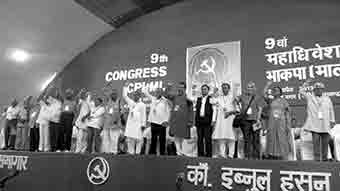
From 2 April to 6 April, the delegate session took place, which was conducted by a 11-member Presidium. 1024 delegates and 163 observers deliberated on and adopted a wide range of policy resolutions that would guide the party’s practice – including the working class movement, agrarian and other rural struggles, women’s movement, student-youth movement, intervention in panchayats, the urban work of the Party, media and culture and environmental protection and people-centric development. he 9th Congress demanded justice for the victims of the war-crimes during the Bangladesh war of 1971, and the genocide of Tamils in Sri Lanka. The 9th Congress also committed itself to uphold the legacy of Hugo Chavez – who had fired the imagination of the Left worldwide with his bold anti-imperialist resistance, his assertion that socialism is possible, and his model of regional and neighbourly solidarity instead of war-mongering, all of which is especially relevant for the people of India and the sub-continent.
Late at night on April 6, the CPI(ML)’s Party Congress elected a new 59-member Central Committee, which in turn elected a 17-member Polit Bureau and re-elected Dipankar Bhattacharya as General Secretary. A 7-member Central Control Commission was also elected with Ramjatan Sharma as its Chairperson.
The guests from CPM Punjab, CPRM, and Lal Nishan Party (Leninist), as well as from RWPB and Socialist Alliance Australia, attended the Congress throughout.
Many artists and comrades had worked day and night to make the city of Ranchi and the venue of the Party Congress come alive beautifully with red flags, banners and other decorations. Paintings by the young painter Anupam Roy were displayed on the street next to the 9th Congress venue, catching every eye. Especially striking and evocative was an installation by sculptor Vineet, which had imaginatively used a fallen tree to convey the struggles of people against corporate land grab and environmental devastation. Teams and performers from various states held a Cultural Evening on 6 April.
The CPI(ML)’s 9th Congress concluded on April 7, 2013 with a massive ‘People’s Alternative Rally’ at the Vidhan Sabha Maidan at Ranchi. The rally called for a people’s political alternative to the UPA-NDA model of pro-corporate and anti-democratic governance. The Rally was presided by Bahadur Oraon, and addressed by CPI(ML) General Secretary Dipankar Bhattacharya, Revolutionary Workers’ Party of Bangladesh General Secretary Saiful Haq; Sue Bolton of Socialist Alliance; Mangat Ram Pasla, Secretary of CPM Punjab; RB Rai, President of CPRM; and Vijay Kulkarni, Central Committee member of the Lal Nishan Party (Leninist); CPI(ML)’s MLA in the Jharkhand Assembly and newly elected Central Committee member Vinod Singh; All India Kisan Mahasabha General Secretary Raja Ram Singh; and CPI(ML) Polit Bureau members Kavita Krishnan and Dhirendra Jha.
| Excerpts from Statements of Left Leaders
|
|---|
.
International Greetings
International guests - the CPN(UML) General Secretary Ishwar Pokhrel, RWPB General Secretary Saiful Haq, and Socialist Alliance representative Sue Bolton, were felicitated by the Congress, and addressed the 9th Congress on the night of April 2nd. Solidarity messages from various international parties that could not attend, were read out. Below are excerpts from international messages of greeting and solidarity.
CPN(UML)
I would like to revive my memories of those days when the people of Jhapa and Naxalbari had such deep relations not only of physical proximity but of class friendship.
We are aware that India has made gret economic strides today. But the question is – what is the cost and whether India is ready to share this prosperity with its poor neighbours like Nepal. If the prosperity of India is only for a small section of capitalists and ruling class of India, and the vast majority is still denied basic necessities, then such progress means nothing to Indian people and even less for Nepal people. We request all progressive forces of India to raise their voice for an equitable relation with Nepal and cancellation of all unequal treaties between the two countries. We also express our solidarity with the Indian people in their struggle for a just society and against feudalism and imperialism.
The frequent exchange of visits and ideas and experiences between our two parties have been very helpful for both of us and we hope that our relations develop even further in the coming days. I wish many successes for CPI(ML) Liberation in the coming days and express my best wishes for the success of this Congress.
- Ishwar Pokhrel,
General Secretary
UCPN(M)
We received your invitation in time, and we were very eager to participate in the Congress. But due to the political complexity and uncertainty, we regret to state that delegates from our party will not be able to take part in the Congress. We are desirous to strengthen the existing fraternal relations between our two parties in the days to come. We feel proud if leaders from the both parties join their hands for such purpose.
We would like to convey our best wishes for the grand success of the upcoming congress.
Surendra Kumar Karki ‘Partha’
In-Charge, International Bureau
Revolutionary Workers Party of Bangladesh (RWPB)
We are here at a moment when in Bangladesh we are witnessing an unprecedented wave of youth and students rising, demanding just trial and punishment of war criminals, banning of communal outfits and for a genuine democratic secular state on the basis of the spirit of our great liberation struggle in 1971. It is the left and left-leaning student, youth, cultural organizations along with progressive bloggers who are playing a very significant role within this mass uprising.
Because of the particular objective situation in our respective countries there are unique problems and issues and differences of strategy and tactics among revolutionary parties, but obviously there are common grounds among us, based on which we can come closer and share our experiences and ideas, and coordinate our campaign. Let us stand together with revolutionary courage and commitment. Once again I congratulate all of you and wish every success to the 9th Congress of CPI(ML) Liberation.
Saiful Haq,
General Secretary, RWPB
New-Democratic Marxist-Leninist Party, Sri Lanka
We appreciate the principled and consistent stand of your Party on the Sri Lankan national question whereby it steered clear of narrow nationalism while unreservedly criticizing the chauvinist state.
Our Party highly treasures the goodwill between the peoples of India and Sri Lanka and the friendly relationship between our two parties. It particularly appreciates the sustained support that you have given it by publicising important statements and other publications, and the continuous provision by your Party Secretariat of important political documentation on national and global issues.
While the Politburo of the Party regrets its inability to attend the 9th Party Congress at a time when things are taking a critical turn globally and in India and Sri Lanka, it sends its sincere fraternal revolutionary greetings to your Party on the occasion of its 9th Congress, reaffirms the solidarity of our Party with the Communist Party of India (Marxist-Leninist,), and wishes the 9th Party Congress a well deserved grand success.
Fraternally
Comrade SK Senthivel
General Secretary, New-Democratic Marxist-Leninist Party
Socialist Alliance, Australia
I was inspired by the account of the Ghadar movement at the beginning of your congress. This rebellion shows the true spirit of internationalism with Punjabi migrants in North America and Canada protesting against the racial discrimination they experienced. These Punjabi migrants were radicalised by this protest movement as well as being inspired by the Mexican revolution and the Irish uprising so that they returned to India to fight colonial rule.
That story conveys the true spirit of internationalism.
More recently, our comrades in Socialist Alliance have been inspired by the CPI-ML comrades in you campaign against rape culture and for freedom for women. We had a similar incident in my city, Melbourne, where there was an outpouring of sentiment against rape. This has led to a new rise in the women’s movement, with feminist campaigning for the first time in many years.
The role your comrades played in putting forward progressive politics, highlighting the need for fight against sexist culture and highlighting rapes by the military and police and marital rape was an example of the important role that left parties can play in helping spontaneous movements develop in a progressive direction.
The world is more linked now than ever, with capitalists chasing lower and lower wages as they shift production from country to country.
In a big warehouse strike in Melbourne early this year, Indian workers played an important role as part of the strike.
We’ve also got the situation of South Asian students experiencing super-exploitation as they work for jobs under the minimum wage and experience racism. Some of these students have gone on to get involved in unions and local movements.
The capitalist political parties in Australia tell us that Australia has escaped the world economic crisis. But it’s highly unlikely that we will escape.
We are trying to develop a stronger left response in preparation for the economic austerity that we know is around the corner by exploring left unity with one of the other left parties.
We know that this period has great challenges for the left. In times of economic crisis it isn’t inevitable that people will look to the left. Some will look towards the right. In Greece, as well as the spectacular rise of the left, the far right has also grown with a section of the population blaming migrants and refugees for the crisis.
It’s not enough to be against what capitalism is doing. People have to understand that there is an alternative.
The left has to help people imagine an alternative to capitalism and imagine the possibility of a socialist world. We have to come up with the slogans which point in the direction of a world that isn’t controlled by the corporations.
Let’s make socialism an alternative that people can relate to.
I hope you have a successful 9th congress.
Long live the struggle for socialism.
Sue Bolton
French Communist Party (PCF)
We are confronted, in France, with a complex political situation where the win of the candidate of the Socialist Party, with decisive support of our Left Front, has lead in some months to a big disenchantment in the face of the absence of resistance to the diktats of “financial markets” from the new government and from the French President.
The crisis of capitalism imposes dramatic consequences on living conditions and on hopes of human beings for the great majority of the populations of our countries. Mankind deserve better. We can make it better. We must surely reinforce our collaboration. Full success to findings of your congress in this right way.
Lydia Samarbakhsh
Member of national coordination in charge of foreign relations ships
Embassy of the Bolivarian Republic of Venezuela in India
Comrades and participants of the CPI(ML) 9th Party Congress, warm greetings from the Bolivarian Republic of Venezuela.
The legacy of Commander Hugo Chavez, the leader of the Bolivarian Revolution, is already being carried out in all spheres. In this revolution’s unending struggle against imperialism, Chavez took a stand against the world order imposed by the superpowers. The ideas of the Commander, expressed as a liberating school of thought known as ‘chavismo,’ apart from having class consciousness, is anti-imperialist, socialist, and consequently, against capitalism.
The Socialism of the 21st Century is not just for Venezuela or Latin America. It is a model for the oppressed people of the world, a guide to fight capitalism.
The people and the Government of the Bolivarian Republic of Venezuela wish success to the participants of the CPI(ML)’s 9tjh Party Congress in its deliberations and outcomes in order to gradually move towards the achievement of a more just and egalitarian society with greater social justice.
Long Live Hugo Chavez!
Long Live the Bolivarian Revolution and Socialism of the 21st Century!
I avail myself of this opportunity to renew to the Communist Party of India (Marxist-Leninist) the assurances of my highest consideration.
Truly yours,
Milena Santana-Ramirez,
Ambassador of the Bolivarian Republic of Venezuela
National Democratic Front of the Philippines (NDFP)
The National Democratic Front of the Philippines (NDFP) conveys its warm greetings of solidarity to the leadership and membership of the Communist Party of India (ML) on the auspicious occasion of your 9th Party Congress on 2-8 April 2013.
We wish you utmost success in consolidating and expanding your ranks in pursuing the manifold revolutionary tasks in upholding and defending the fundamental interests of the Indian people, fighting against the ever worsening oppression and exploitation by imperialist powers and their local cohorts, and advancing the struggle for the national and social liberation of the Indian people.
We in the National Democratic Front of the Philippines are also waging a revolutionary struggle against US imperialism and the local reactionaries presently led by the Aquino regime.
Dear comrades, we wish you a victorious 9th Party Congress! The revolutionary struggle of the Indian people is a very significant part of the worldwide revolutionary struggle against imperialism and for socialism.
Long live the solidarity between the Indian people and the Filipino people!
Long live anti-imperialist international solidarity!
Comrade Luis Jalandoni
National Democratic Front of the Philippines
Revolutionary Organization of Labor, USA
Revolutionary Greetings to the 9th Congress of the CPI (ML)-Liberation! In the spirit of proletarian internationalism, we send our best wishes that the 9th Congress of your party being held in Ranchi, Jharkhand, India, will provide positive steps for the Indian masses and your proletarian vanguard forces to advance the struggle against the Indian state and imperialism, headed by U.S. imperialism, and for national democratic and socialist revolution in your country and throughout the world.
As representatives of the revolutionary proletariat “in the belly of the U.S. imperialist beast,” we pledge to continue to do our best to contribute to this global struggle. We look forward to future revolutionary collaboration of our two organizations in the interest of all the oppressed and exploited of the earth.
With comradely regards,
Rose, for the
Revolutionary Organization of Labor, USA
Socialist Alternative, Australia
Please accept our warmest regards and revolutionary greetings on the occasion of your 9th Party Congress. We acknowledge the tremendous sacrifices that have been made and the tireless work carried out by your comrades in the struggle for socialism in India.
We send the Communist Party of India (Marxist-Leninist) our solidarity and wish you all the best for the future. We look forward to developing closer relations between our respective organisations.
The fight for socialism is a world-wide fight and we stand with you in this our struggle: Workers of the world unite!
Comradely regards
Tom Bramble,
On behalf of Socialist Alternative
Let us Unite and Rise to the Occasion

(Address of Comrade Dipankar Bhattacharya, General Secretary, CPI(ML) at the Inaugural Session of the 9th Congress of the CPI(ML), Comrade Ram Naresh Ram Auditorium (District School Ground), Birsa Nagar (Ranchi), 2 April 2013)
Members of the outgoing Central Committee and Central Control Commission of the Party, comrades from various constituents of the Indian Left movement, esteemed guests from the communist movement in Nepal, Bangladesh and Australia, friends from the Reception Committee, activists from various ongoing people’s struggles in Jharkhand, friends from the intelligentsia and media, and delegates and observers participating in the 9th congress of the CPI(ML),
It is a moment of great pleasure and honour for me to extend my revolutionary greetings and a very warm welcome to all of you. The campus of the 9th Congress of the CPI(ML) is dedicated to the memory of our beloved leader Parasji, Comrade Ram Naresh Ram, and the stage is named after Comrade Ibnul Hasan Basru, two members of the CC elected by the 8th Congress who are unfortunately no longer with us but their legacy will continue to inspire us in the days to come.
We meet here in the midst of a very challenging situation. Hugo Chavez, a towering leader of the international socialist movement of our times, died prematurely a month ago and his country will elect the next President on the coming 14th of April. At a time when socialism was sought to be discredited and declared dead in the wake of the collapse of the Soviet Union, Chavez had rekindled the socialist imagination by tapping the storehouse of people’s strength and energy to take on US imperialism and project a vision of socialism pulsating with the spirit of participatory democracy. We are confident that the Venezuelan people who defeated the US-backed coup attempt in 2002 will once again defeat the US design to destabilise Venezuela and carry forward the shining legacy of their dear leader.
The US and its allies have now taken their war campaign to Africa even as Washington’s Iraq war has entered its second decade and the US-Israel nexus continues to target one inconvenient regime after another in the Arab world. War, colonisation and fascism have historically been the desperate escape-route sought by capital in crisis and once again we can see the global capitalist crisis threatening to escalate along this dangerous trajectory.
The crisis is however pregnant with great opportunities and glorious possibilities. Worldwide there is a renewed upswing in popular anti-capitalist assertion and anti-imperialist resistance. From the Occupy movement to anti-austerity struggles, from Tahrir Square to India Gate and Shahbagh, the air is once again thick with popular aspiration for change and progress. There is a definitive rekindling of the socialist imagination, and the Left is once again advancing in varied forms.
From the platform of the 9th Congress of the CPI(ML) we reiterate our solidarity with the international working class movement and with popular struggles for freedom, democracy, justice and socialism in every part of the world. We are very happy to have in our midst comrades from Nepal, Bangladesh and Australia and extend our warmest wishes to them for bigger victories in the coming days. We are also inspired by the messages of greetings we have received from comrades from Pakistan, Philippines, France, Greece and Venezuela. We look forward to developing closer ties of solidarity with progressive forces worldwide and especially in South Asia.
We are also happy that this inaugural session is being addressed by a broad spectrum of organisations of the Indian Left. Closer political understanding among various organisations of the Left and effective united action is the need of the hour. The Indian Left needs a new model of united struggle and we hope the coming together of such a broad spectrum of Left organisations and leaders in the inaugural session of the CPI(ML)’s 9th Congress will facilitate the process of building broad-based fighting unity of the Left. We also seek cooperation with a whole range of democratic forces who are engaged in fighting against the corporate-imperialist invasion of our economy, against the repressive measures of the state and against feudal, patriarchal, communal and sectarian violence.
Indeed, vast sections of the Indian people are daily exhibiting their readiness and resolve to fight for an end to injustice and oppression, for a more meaningful democracy with real rights for the people. In recent months we have seen powerful upsurges of the Indian people against corruption and corporate plunder and for freedom of women from patriarchal violence. The participation of more than 100 million workers in an unprecedented two-day general strike on 20-21 February marked a new high in India’s working class movement. And the peasant-adivasi resistance on the ground to the corporate land-grab offensive shows the depth of determination of the people. The Left and democratic forces must rise to the occasion and lead the people’s quest for an alternative to a decisive victory.
The scam-tainted and US-worshipping government at the Centre has lost all credibility and survives on outside support manipulated through a carrot and stick strategy – carrots of special packages and sticks of CBI raids. Yet it goes on inflicting blow after blow on the survival of the people. With elections approaching, we must get ready to vote out this regime of loot and repression. But it is not enough to vote out this government – we also have to vote out the government-in-waiting and give a fitting rebuff to the corporate-fascist clamour to make Narendra Modi India’s Prime Minister and replicate the Gujarat model on an all-India scale. We have to vote out the pro-corporate policies that have spawned such a huge web of corruption and put the resources of the country and the livelihood of the people at stake. We have to vote out this non-transparent unaccountable culture of governance and establish the principle of accountability and primacy of people’s welfare and people’s rights over every other consideration.
Jharkhand has been the most tragic victim of the politics and economics of corporate plunder. Since it was formed in November 2000, this resource-rich state which is currently under president’s rule has already had four Chief Ministers and all sorts of coalitions involving the BJP or the Congress on the one hand and various regional parties on the other. More than a hundred MOUs have been signed by these governments to satisfy corporate greed completely disregarding the interests and opposition of the indigenous and local people and making an utter mockery of the legal safeguards that are already in place.
In order to transform the state into a laboratory of loot, successive governments have unleashed brutal repression killing and jailing leaders and evicting the people. Comrade Mahendra Singh, the legendary CPI(ML) leader who had challenged this order of loot and repression was killed in a political conspiracy in January 2005 and till date the conspirators have not been brought to justice. Hundreds of our activists and elected people’s representatives have been implicated in false cases and many are in jail. Yet the movement has marched on and the fact that we are able to hold our 9th Congress today in Jharkhand is a testimony to the strength and resilience of the people and the revolutionary movement.
From the podium of the 9th Congress of the CPI(ML), we rededicate ourselves to the task of freeing Jharkhand and the whole country from the corporate clutches and securing the greatest democratic rights of the Indian people. We thank all our friends in the Indian and international communist and Left movement for their solidarity and encouragement. We thank all our supporters and well-wishers in Jharkhand and rest of the country who have extended their valuable support to enable us to organise this 9th Congress in Ranchi, the capital of Jharkhand which we have renamed for the occasion as Birsa Nagar in memory of Birsa Munda, the legendary fighter for freedom and emancipation.
The 9th Congress of our Party will discuss and adopt a series of resolutions and reports to guide our practice in the coming days. We will discuss the political situation in the country and major international developments, we will take a fresh look at our Party programme and take stock of the Party organisation, and we will adopt policy resolutions dealing with the working class movement, agrarian and other rural struggles, women’s movement, student-youth movement, intervention in panchayats, the urban work of the Party, media and culture and the increasingly important agenda of environmental protection and people-centric development. We will also elect a new central committee and a new central control commission to lead and regulate the Party in the coming days.
We hope with your cooperation and support the Congress will succeed in conducting its agenda successfully, equipping the Party with fresh ideas, energy and determination in fulfilling its responsibilities, the expectations of the people and the demands of the situation with all its strength.
Red Salute to our great martyrs and departed leaders!
Long live progressive international solidarity!
Down with imperialism!
Long live revolution!!
Central Committee and
Polit Bureau Elected by CPI(ML) 9th Congress
Com. Dipankar Bhattacharya (PB)
Com. Swadesh Bhattacharya (PB)
Com. Kartick Pal (PB)
Com. DP Buxi (PB)
Com. Rubul Sarma (PB)
Com. S. Kumaraswamy (PB)
Com. Ramji Rai (PB)
Com. Amar (PB)
Com. Arindam Sen (PB)
Com. Swapan Mukherjee (PB)
Com. Kunal (PB)
Com. Dhirendra Jha (PB)
Com. Janardan Prasad (PB)
Com. Manoj Bhakta (PB)
Com. Partha Ghosh (PB)
Com. Kavita Krishnan (PB)
Com. Prabhat Chaudhary (PB)
Com. Nand Kishore Prasad
Com. N. Murthy
Com. B B Pandey
Com. Rameshwar Prasad
Com. Meena Tiwari
Com. S. Balasundaram
Com. V. Shankar
Com. Malleshwar Rao
Com. Bangar Rao
Com. Rajendra Pratholi
Com. Krishna Adhikari
Com. KD Yadav
Com. Saroj Chaube
Com. Shubhendu Sen
Com. Mrinmoy Chakravarty
Com. Sanjay Sharma
Com. Kalyan Goswami
Com. Abhijit Mazumdar
Com. Sudhakar Yadav
Com. Rajaram Singh
Com. Raja Bahuguna
Com. Rajwinder Rana
Com. Gurmeet Singh
Com. Balasubramanian
Com. Bhuvana
Com. Shashi Yadav
Com. Mahboob Alam
Com. Ishwari Prasad Kushwaha
Com. Mohd. Salim
Com. Salil Datta
Com. Prabir Haldar
Com. Yudhishthir Mahapatra
Com. Mahendra Chaudhary
Com. Partho Karmakar
Com. Bibek Das
Com. Pratima Ingheepi
Com. Rabi K. Phangcho
Com. Anant Prasad Gupta
Com. Vinod Singh
Com. Rajiv Dimri
Com. Ravi Rai
Com. Ramjatan Sharma
(Ex-officio member)
Central Control Commission Elected by
CPI(ML) 9th Congress
Chairperson
Com. Ramjatan Sharma
Members:
Com. Devendra Singh Chauhan
Com. Vidya Rajwar
Com. Sukhdev Prasad
Com. Amalendu Choudhary
Com. Chandramohan
Com. Chiranjeeb Bhattacharya
CPI(ML)’s 9th Congress:
Change with Continuity,
Development with Expansion
[Excerpts from the explanatory remarks by General Secretary Comrade Dipankar Bhattacharya, made in the course of the deliberations in the delegate session.]
The resolution on the international situation begins with the crisis of global capitalism and goes on to focus on the political implications of the crisis and the possibilities opening up in terms of what we call a rekindling of socialist imagination. The crisis has sharpened the economic rivalry among major economic powers, especially among the US and China. While the US is still the biggest economy it is thoroughly crisis-ridden, and while China is inching closer to the top spot, it has also been affected by the crisis and has slowed down considerably. But to China’s credit, it has adjusted better with the crisis and adjusted primarily in favour of the working people and not in favour of the corporations as the US has done. China has moved away from investing in infrastructure to improved social spending and wage increases so as to increase the purchasing power of the people and promote domestic consumption. 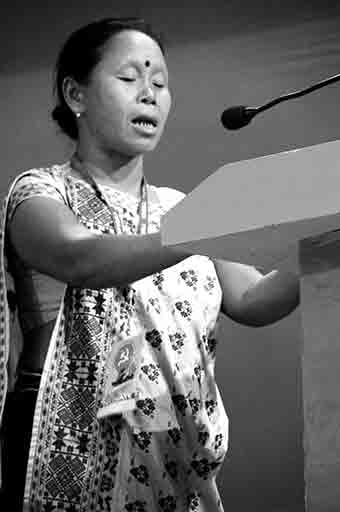
US-China Rivalry
The intensification of Sino-US economic rivalry is bound to have political and military implications. After all as Marxists we all know that at the end of the day politics is the concentrated expression of economics. We can already see a change in China’s external economic development. The China story has so far been different from the erstwhile Soviet Union in terms of how China manages its economy and the Sino-US rivalry. While the USSR had heavy involvement through aid and trade in Eastern Europe and many countries of the third world, China had primarily been following the export of goods route. Also while the USSR had got embroiled in a debilitating arms race with the US, China has developed a high degree of economic interdependence with the US.
But China’s growing economic involvement in Africa - and now BRICS has also made major commitments to aid economic development in Africa - indicates a different route. The US, and former colonial powers like France and Britain, have on the other hand their own greedy eyes trained on Africa. The continent is naturally emerging as the next theatre of not just economic rivalry but politico-military contention. If this continues, we are likely to see a change in China’s international role.
Indian Foreign Policy
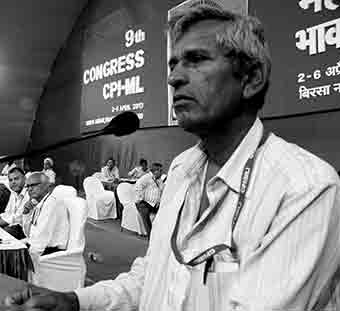 Apart from the so-called ‘war on terror’, containment and encirclement of China is the other major strand of US foreign policy. On both scores we want Indian foreign policy to be free and delinked from the American policy. We want India to deal with China and all other neighbouring countries on an independent footing, and respect and address their concerns vis-a-vis India’s role and resolve all outstanding issues in a spirit of good-neighbourly relations and mutual cooperation.
Apart from the so-called ‘war on terror’, containment and encirclement of China is the other major strand of US foreign policy. On both scores we want Indian foreign policy to be free and delinked from the American policy. We want India to deal with China and all other neighbouring countries on an independent footing, and respect and address their concerns vis-a-vis India’s role and resolve all outstanding issues in a spirit of good-neighbourly relations and mutual cooperation.
Regarding Sri Lanka, we want the international community to exert pressure for a fair probe into the war crimes perpetrated on Sri Lankan Tamils. India should do all it can to expose the war crimes and mobilise the international opinion for justice for Sri Lankan Tamils.
But why do we not ask the Indian Government to impose sanctions on Sri Lanka? We know it very well that the Indian ruling classes harbour regional hegemonic ambitions and the people in almost all neighbouring countries have serious doubts or reservations about the role of the Indian ruling classes in South Asia. Communists should not give a handle to the ruling classes to pursue a course that will invite greater isolation and mistrust from our neighbours.
Indian foreign policy vis-a-vis Sri Lanka has been full of flip-flops – first India went to the extreme of promoting and facilitating LTTE and then went over to the other extreme of sending Indian Army to Sri Lanka in the name of ‘peace-keeping’ and finally kept mum while war crimes were being committed. We must also be careful that the cause of justice for Sri Lankan Tamils and the justified anger against Sinhala chauvinism should not lead to acts of xenophobic violence or prejudice against common people of Sri Lanka. The attacks on Sri Lankan Buddhist monks in Tamil Nadu or ban on Sri Lankan players playing in Tamil Nadu must therefore be condemned in no uncertain terms.
21st Century Socialism
20th Century had been witness to both the rise of the USSR – its emergence as a progressive alternative to capitalism and an alternative power centre against imperialist domination – and its collapse. We all now know that the Soviet model had ossified from within so much so that it collapsed without US imperialism having to fire a single bullet. China accomplished new democratic revolution and embarked on the road to socialist transition, it has emerged as a big power and a powerful nation along the road, but from the point of view of building and inspiring a socialist alternative to capitalism and bourgeois democracy, China can hardly be called a model. Indeed we cannot talk of any standard model of socialism today. Socialism of the 21st Century, the term popularised by Chavez struck a chord because it rekindled the socialist imagination and spirit while also acknowledging that despite some brilliant phases and many glorious achievements, 20th century socialism had been found deficient in some key respects and that socialism today must pulsate with the spirit of mass participation and reflect a comprehensive rupture with capitalism in every major respect – in terms of resource management, statecraft and welfare and assertion of the common people.
Venezuela under the leadership of Chavez has of course played a great historic role in terms of transforming itself, defending and helping Cuba, and bringing about a paradigm shift in Latin America with its vocal anti-imperialism, bold welfare measures and refreshing accent on participatory democracy. But it will be wrong to treat it as the latest model of socialism. We must realise that socialism has to develop on the concrete soil of a society and in the given setting of history. Just as it will be wrong to downplay the leftward shift in Latin America, or the rise of the Occupy movement or the anti-austerity struggles in Europe because we do not often see the standard form of communist parties and class struggle in these upheavals, it will also be wrong to fetishize the forms and patterns we see in these countries as the new universal forms for the international communist movement. 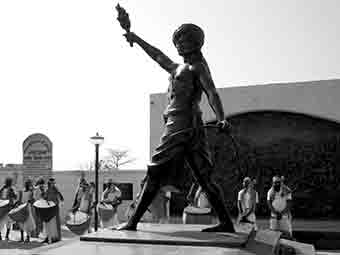
In some ways the scene in the international socialist or anti-capitalist movement today is comparable to the days of the First International where different tendencies within the international working class movement worked together and the communist movement had to define and develop its formative principles simultaneously in collaboration and contention with various non-communist trends and tendencies. If historically, mass-based communist parties have found it difficult to grow in several advanced capitalist countries and also parts of the third world, and if some communist parties have collapsed because of a host of subjective and objective factors, that does not certainly make communist parties historically redundant or anachronistic.
While recognizing the need and power of broad-based and seemingly spontaneous upsurges, we must realize that the concentrated social power called capital and the organised political power of the capitalist state can only be overcome by pooling together the energies of millions of working people, by unifying the power of resistance and creation of the working people and this has been the raison d’être of the communist movement and communist parties as the revolutionary political voice of the working people.
While learning from the rich and multifarious history of the international socialist movement and acknowledging and appreciating the ongoing awakening in its multiplicity of forms and plurality of patterns, we firmly realise that we can contribute to this process of socialist regeneration by strengthening the mass revolutionary character of the Indian communist movement and expanding and developing the CPI(ML) as its most consistent and credible banner.
The Danger of Corporate Fascism
This is not the first time people are talking of the fascist threat in India. The term first came up in the mid 1970s when the constitutional framework of parliamentary democracy was eclipsed by the Emergency, and many constitutional rights and provisions were suspended. The rise of the BJP at the head of an aggressive communal campaign through the 1990s brought the term communal fascism into coinage. It pointed to the fascist threat that aggressive majoritarianism or majority communalism posed in a country like India with a long history of orchestrated communal violence.
Now we think the danger of fascism in India should be prefixed by the epithet corporate and not just communal. Narendra Modi is the unmistakable mascot of this corporate fascist politics – Modi in 2002 was a symbol of aggressive communalism, today a decade later he has emerged as the biggest corporate darling. He personifies the unbridled pro-corporate thrust of India’s ruling economic policies and also symbolises the ‘strong state’ approach to governance where the state subjugates the people and allows the corporates a free run. 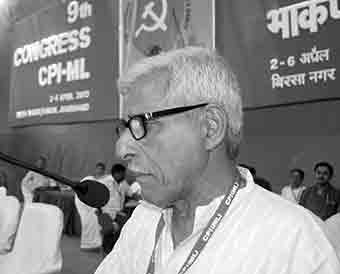
Communalism too has acquired a new context. Communalism is not about inter-community differences and disputes – India has a long history of coexistence of several religions and an equally long history of mutual respect and tolerance for, and even assimilation of, different beliefs and values. Communalism became an ‘ism’ when the British colonialists started using and promoting it as a key weapon in their ‘divide and rule’ strategy and the Congress, Hindu Mahasabha and Muslim League began to consciously mix religion with politics. The secularism adopted by the Indian state was never robust – it never really meant much more than not overtly allowing Hinduism to become the official religion of the Indian state. But since 1980s we have seen a weakening of even that limited secularism and a growing majoritarian bias of the Indian state reflected most glaringly in the November 1984 anti-Sikh pogrom, in the December 1992 demolition of Babri Masjid and the 2002 Gujarat genocide.
There is another recent change in the global political arena that has also had a major bearing on the issue of communalism and minority rights in India. Following the Soviet collapse the US began to identify Islam as its global enemy and launched a veritable global war in the wake of 9/11. And now that India has emerged as a key strategic partner of the US, the US-inspired Islamophobia has reinforced the majoritarian bias of the Indian state which is why we see such a high incidence of anti-Muslim witch-hunt. If communalism was ‘nationalised’ by the British colonialists after 1857, it has been ‘internationalised’ by the US imperialists after the collapse of the Soviet Union and especially following 9/11.
To effectively oppose communalism and fight for secularism, it is therefore not enough to oppose only RSS and BJP. We must pose this new litmus test of secularism – whether or not one is ready to take on the majoritarian bias of the Indian state, whether or not one is ready to fight US imperialism not just in the context of Iraq and Afghanistan but in the context of all the disastrous implications of Indo-US strategic partnership? We must effectively combine the anti-corporate, anti-imperialist and anti-communal dimensions of our movement to defeat the fascist danger. To be secular in India today one has to be democratic and also anti-imperialist.
The Question of Left unity
Left unity has been and can only be a protracted agenda of political struggle. The CPI(M) established one model of Left politics and one model of Left unity. We have a different model of Left politics and have initiated a different model of Left unity. The defeat of the CPI(M) in Bengal and the decline in its profile in the national political arena has marked a big blow for its opportunist line and it has strengthened debates in and around CPI(M) and sharpened the anti-opportunism struggle within the Left movement as a whole. At this juncture we have adopted a two-pronged approach to advance the battle for Left unity. 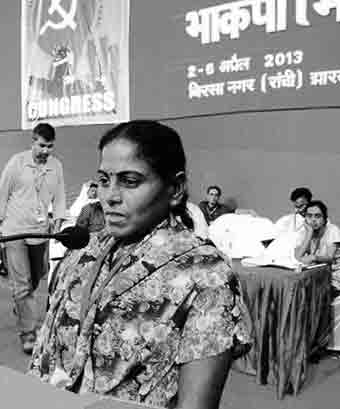
In the first place we have formed an All India Left Coordination with four other Left organisations on the basis of a common declaration and considerable political agreement in terms of tactical line and the present priorities of struggle. AILC had begun with four organisations, now it has five constituents. In the coming days, the AILC may well become a bigger platform with more organisations joining in. While the CPI(M)-led Left Front is identified predominantly with the now defeated CPI(M)-led government in West Bengal, the AILC is developing as a platform of united struggle. On 14 March 2011, AILC organised an impressive march to Parliament calling for resignation of the scam-tainted MMS government. On August 31 2012, the jail bharo campaign launched by AILC evoked encouraging response with more than 150,000 people courting arrest in 170-odd centres across the country. AILC also played an active role in the 20-21 February all-India strike.
But the AILC is not an end in itself, the purpose of AILC is to bring about a radical realignment of Left forces and radicalise the Left movement as a whole. From AILC as well as CPI(ML), we therefore continue to reach out to various constituents of the Left camp and explore possibilities of joint action. The September 30 convention in Delhi was a major effort in that direction which was attended by almost all Left parties, the CPI(M) being the only party choosing to stay away. In the inaugural session of this Congress we extended invitation to a broad spectrum of Left organisations and they all responded positively.
The fact that the CPI(M) and its LF allies have objectively been pushed into an oppositional role both in West Bengal as also in the national arena has improved the prospect of joint action among various Left forces. But there are very clear hindrances as well. The CPI(M) pins greater hope on its presumed ability to utilise the Congress than on the capacity and willingness of the people to resist the TMC in West Bengal. The CPI(M) and more particularly the CPI has a pronounced preference for regional parties at the cost of Left unity. They have electoral ties with the BJD in Odisha even as the BJD government is bent upon dispossessing the people in Niyamgiri, Jagatsinghpur and many other parts of the state. Similar overtures can be seen being made to the JD(U) in Bihar and JVM in Jharkhand. In spite of these hindrances, we must keep up our efforts for meaningful unity of the Left on issues that concern the common people.
The General Programme of the Party
We have made some changes in the General Programme of the Party. What exactly have we changed and why have we done it? We used to describe the Indian society as semi-feudal and semi-colonial even as we characterised the Indian state as a state led by the big bourgeoisie in alliance with landlords. Obviously the word semi-feudal did not preclude capitalist development – where else did the big bourgeoisie then come from? Capitalist development remained implicit in the description ‘semi-feudal’ and we in fact always made it clear in our explanation that the term ‘semi-feudal’ referred to the pattern or character of capitalist development in India. But still the term seemed to focus on feudal remnants even as the onslaught of big capital grew by leaps and bounds in recent years. We therefore decided to foreground the reality of capitalism without suggesting any weakening or decline of the feudal remnants. Likewise, the term ‘semi-colonial’ while capturing the persistence of colonial hangovers and the overall pro-imperialist character of the Indian big bourgeoisie, could not adequately reflect the growth of Indian capital and the big power ambitions of the Indian state. We have therefore decided to describe the Indian society as a predominantly agrarian backward capitalist society, clearly and categorically mentioning the feudal remnants, colonial hangover and the domination of imperialism in the same sentence. 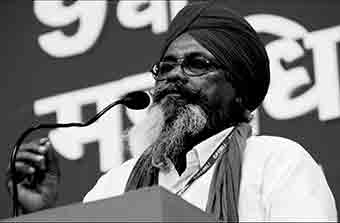
There is no change in the programme in the characterisation of the Indian big bourgeoisie, but we have underlined the growing hold of the kulaks – the biggest beneficiaries of whatever degree of capitalist development has happened in Indian agriculture – on the Indian state. So the programme now states that the state is led by the big bourgeoisie in alliance with landlords and kulaks.
The other change we have made is in the formulation of the principal contradiction. In place of identifying the contradiction between feudal remnants and the broad Indian masses as the principal contradiction we now consider it as one of the major or basic contradictions. Feudal remnants are being reinforced and utilised by Indian big bourgeoisie as well as imperialism, in real life we often come across a nexus of feudal remnants, big capital and imperialism rather than just feudal remnants on their own. We have therefore taken the contradiction between this nexus and the Indian people as the principal contradiction.
The stage of the revolution remains the same – people’s democratic revolution with agrarian revolution as its axis. It has been asked why we need to prefix capitalism with the epithet backward. Well, there is capitalism and capitalism. Not everywhere does capitalism coexist with Khap Panchayats and Ranveer Sena, the high degree of caste and gender oppression that we experience in India may not be incompatible with capitalism but is not intrinsic to capitalism either. We thought the word backward could be the best catch-all term to take care of all the obnoxious specificities of Indian society that continue in spite of, and also because of, the specific mode of capitalist development in India.
We’ve also had some interesting discussion on the stage of our revolution. If Russia could have had socialist revolution in November 1917 what stops us, it has been asked, from declaring the stage of revolution in contemporary India socialist? Can’t the unfinished democratic tasks be taken care of as part of the agenda of a socialist revolution? Well, the fact remains that the democratic tasks still call for a revolution without which there cannot be any meaningful progress towards socialism. If anything, all successful 20th century revolutions have made us realise the protracted nature of the battle for socialism. Russia talked of socialism in 1917 but was forced to beat a retreat very soon, making room for private capital under NEP. In China, Mao said “the struggle to consolidate the socialist system, the struggle to decide whether socialism or capitalism will prevail, will still take a long historical period,” and his words have proved prophetic. 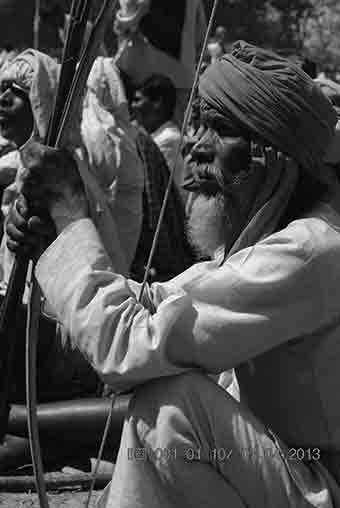
Victorious People’s Democratic Revolution will of course build the foundation and mark the first bold and decisive step towards socialist transition, but placing socialist revolution as the minimum goal of the Communist Party in contemporary India will trivialise socialism and also downplay the democratic tasks and content of our revolution.
Guiding Policies and Priorities on Various Fronts
This time we have made a departure from our standard practice of placing a single political-organisational report before the Congress. We have a political resolution covering the international and national situation, we have an organisational report and we have quite an ambitious series of eight resolutions dealing with the Party’s practice.
In preparing these resolutions we have tried to keep a few salient points in mind. Firstly, we are not making a performance audit of various mass organisations. We are looking at our work on different fronts from the overall point of view of the Party. Secondly, we have not limited the resolutions to our current level of practice on or engagement with various fronts or issues. We have taken note of the objective conditions on various fronts, and focused on the possibilities and challenges facing us and on what needs to be done, based on the experience of our own practice, and keeping in view the changing realities. Thirdly, we must remember that the Party is not a federation of various mass fronts; the Party is guided by a single revolutionary programme and a unifying vision. As communists we work on different fronts, and implement the Party’s programme and policies. Of course, there is sufficient autonomy for every mass organisation and the Party can surely be criticised if there is any violation of that autonomy. But Party members working in mass fronts have dual accountability – they are indeed accountable to their respective mass organisations but as Party members they are surely also accountable to the Party.
And last but not the least, what we have attempted here is not an eclectic combination of a few trendy topics, we have discussed about areas of practice that demand greater attention from the Party and on every front we have discussed various issues that may not have immediate practical implications but on which the Party should develop a collective position or approach. There are many single-issue campaigns or NGOs which are also taking up many of the issues discussed in these resolutions and many of them are no doubt doing a good job in terms of highlighting some specific issues. What we have tried to do is to get a holistic grasp of all these issues as integral parts of our democratic programme and expand the horizons of our practice.
Problems of Party-building
We have discussed problems of Party-building and various imbalances that we face in building the party organisation and developing the Party system. These are organisational questions, but we must also be able to appreciate the ideological or political aspect of these questions. Sometimes some lapses also carry great lessons. Take the case of the recent all-India strike. The entire Party and our trade unions prepared seriously for the strike and played a leading role in many sectors and in several areas and states. But there have been two major aberrations – we failed to implement the strike call in the transport sector in Delhi and the railways. Our union in DTC had served strike notice along with three other unions but withdrew it at the last moment along with the other unions. And this when we find the surface transport sector played a key role in the strike in several North Indian states. Regardless of the circumstances leading to the withdrawal of the strike notice, as revolutionary communists it has surely been a major lapse. Similarly, the All India Railway Party Committee had taken a decision to go for declared strike wherever we have our independent unions, but failed to implement it. We know we do not have the strength to make the strike a success in these sectors, but as revolutionary communists we should have taken the lead and we must lead by example. Had we stuck to the strike call, we could have carried the ideological-political battle in other TUs who all had endorsed the strike call centrally but did nothing to implement it in key sectors like the railways. The two examples show that we are not doing enough to build the communist party among organised workers where trade union culture relatively runs deep and Communist Party can only be built by waging a relentless struggle against economism. We must continue to develop functional unions, run them democratically and secure greater mass strength – but we must not ignore the crucial role of the communist party as the vanguard or as the guarantor of the revolutionary orientation of the trade union movement.
In recent years our student organisation has acquired a high profile and quite deservedly so. The profile has been earned on the basis of years of hard work and a culture of prompt initiatives on a range of subjects. It goes to the credit of our student organisation that they managed not only to defeat SFI in successive elections in JNU but make the SFI/CPI(M) politics unviable in a campus that used to be a traditional stronghold of SFI/CPI(M). There has also been notable expansion to some new states and centres, but we still find that on an all-India scale our student organisation does not yet have the kind of mass strength that it should have. Also, considering the influence that AISA has got in campuses like JNU and several other centres, the flow of student/youth comrades into the Party is surely still far short of the potential. There has surely been some improvement in last few years, but if we take an over-all view, this is definitely one of our weak points. Is it just a question of lack of coordination and planning? Or is there a deeper problem of Party-building that needs to be addressed and resolved? 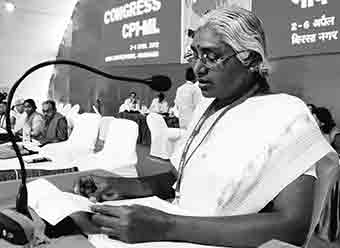
This is why we have once again emphasised the basics of communist politics – it does not develop automatically from within trade union or student politics, however radical our politics may be. Communist politics truly begins and grows only in organic relation with the larger society, through integration with the people, and confidence in the revolutionary communist party and in the struggles of the people. When student leaders and intellectuals begin to exercise and assert that potential, they become threats to the system. It is at the point of linkage with the basic masses, with the workers and peasants that a Chandrashekhar or a Shankar Guha Niyogi or a Safdar Hashmi comes into being.
Towards a Stronger Party and More Vigorous Struggles
To conclude, let me return to the 8th Congress. At the 8th Congress we had to settle the liquidationist debate. The entire Congress and the Party had rallied unitedly to reject the liquidationist framework. It was a debate that had been imposed on the Party and we had no choice. If from within the leading body of a Communist Party there ever emerges an idea that negates the very necessity of its existence and growth, that seeks to restrict and dilute its role and derail it from its course, it becomes mandatory for the Party to resolve that debate first. Liquidationism is however an extreme, rather suicidal advocacy that develops if a party remains weak for a long time. The real answer to liquidationism is therefore a stronger and more vibrant Communist Party.
Over the last five years, which we have described as testing times in our report, the Party has had to face a tough situation. We faced major electoral reverses in 2009 and 2010. At a time when the situation demanded powerful communist response and intervention, the Party found itself in the most awkward situation of having drawn a blank in Bihar Assembly. Had ours been a party of parliamentary cretinism, the Party would have been devastated by this blow. The entire Party pooled its revolutionary resolve fought back with hard work and a whole series of political and agitational initiatives, united front efforts and powerful mass mobilisation. 2011 and 2012 have been a period of renewed assertion of the Party and the movement opening up new avenues of advance. This Congress is a reflection of this turnaround – it is a Congress of change with continuity, and development with expansion. The turnaround has only begun and we must now carry it forward with all our might asserting the full role of the CPI(ML) as the rallying centre of communist revolutionaries, as the party of the Indian revolution.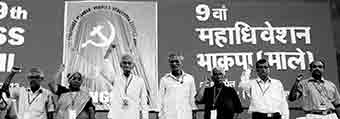
| Obituary
During the Congress, news also reached of the demise of Comrade Monsing Bongrung, Secretary of the Inglong Parpan party branch and President of KANKIS’s Langsomepi block committee in Karbi Anglong. He was 65. Comrade Monsing was from a poor peasant family; after retiring from the Indian Army, he joined the CPI(ML) and became an active leader of the party and the Autonomous State movement. Red Salute of Comrade Monsing Bongrung! |
|---|